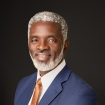Nigerian CEOs are entering 2026 with increased confidence, supported by improving macroeconomic conditions. Nine in ten CEOs (91%) expect Nigeria’s economy to improve over the next 12 months, up from 64% in 2025. This optimism is reflected at the company level, where 56% of CEOs are very or extremely confident in their organisation’s revenue growth over the next 12 months, compared with 30% globally.
Q: How confident are you about your company’s prospects for revenue growth? (Showing only "Very confident" and "Extremely confident" responses)

This confidence is emerging amidst a changing threat landscape. Macroeconomic pressures have eased, with the share of CEOs citing inflation as a high concern falling to 34% and macroeconomic volatility to 25%. At the same time, firm-level risks are more prominent. Cyber risk and availability of key skills are now the most cited threats, each reported by 38% of CEOs. Technological disruption (25%), geopolitical conflict (25%), and tariffs (22%) also feature strongly, shifting leadership focus toward execution capability, resilience, and risk management.
How exposed do you believe your company will be exposed to the following key threats in the next 12 months? (Showing only responses for “Highly exposed” or “Extremely exposed”)

Road to reinvention
Nigerian CEOs are concentrating transformation efforts around four key priorities:
- strategic reinvention
- technology, data and AI
- cybersecurity and trust; and
- sustainability and ESG integration.
Your next move
Turning macroeconomic stability into sustainable growth will require Nigerian CEOs to make deliberate choices about where to focus next, as confidence improves but operational, technological, and people-related risks continue to shape business performance.
Contact us









